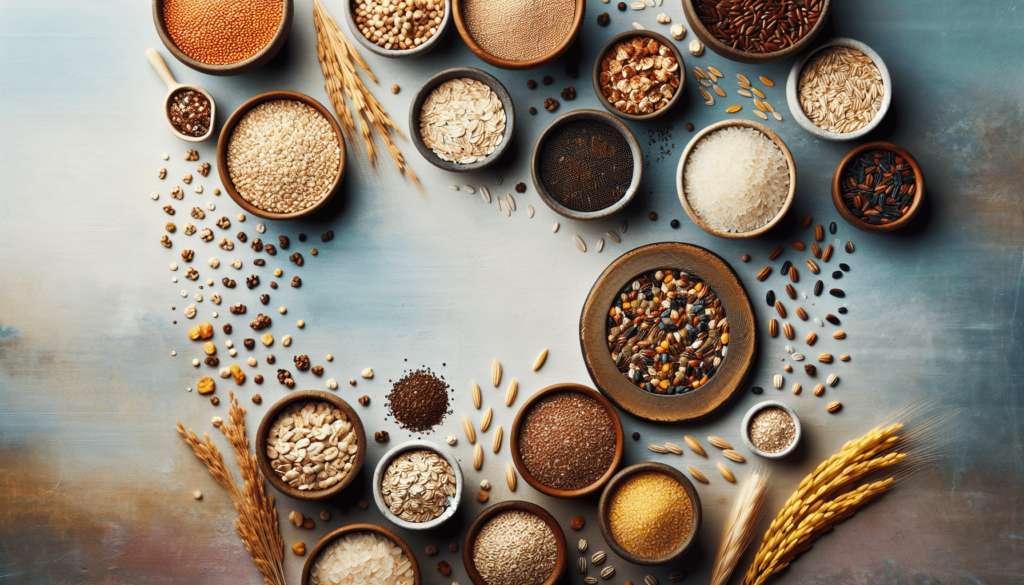Welcome to an eye-opening journey into the world of gut health and whole grains. In this article, you will discover the fascinating ways in which whole grains can positively impact the diversity of your gut microbiota. By incorporating whole grains into your diet, you can nurture a healthy and balanced microbial community in your gut, leading to improved overall health and well-being. Get ready to learn more about the powerful benefits of whole grains for your gut health! How do whole grains contribute to the diversity of gut microbiota?
Have you ever wondered how the food you eat affects the microorganisms in your gut? Let’s take a closer look at how whole grains can positively impact the diversity of your gut microbiota.
What are whole grains?
Whole grains are the seeds of grasses that are consumed as food by humans and animals. Unlike refined grains, which have been processed to remove the bran and germ, whole grains contain all parts of the seed, including the bran, germ, and endosperm. This means that they are higher in nutrients, fiber, and antioxidants compared to refined grains.
A quick breakdown of the components of a whole grain:
- Bran: The outer layer of the grain that is rich in fiber, B vitamins, and antioxidants.
- Germ: The nutrient-rich core of the grain that contains healthy fats, vitamins, and minerals.
- Endosperm: The starchy part of the grain that provides energy in the form of carbohydrates.
Why is gut microbiota important?
Gut microbiota, also known as gut flora or gut bacteria, refers to the trillions of microorganisms that live in your digestive tract. These microorganisms play a crucial role in various aspects of your health, including digestion, immune function, and even mental health. A diverse and balanced gut microbiota is associated with a lower risk of various chronic diseases, such as obesity, diabetes, and cardiovascular disease.
Your gut microbiota is like a community of bacteria living in your digestive system, and just like any community, it thrives on diversity and balance.

This image is property of pixabay.com.
How do whole grains promote gut microbiota diversity?
Whole grains are a rich source of dietary fiber, which serves as a prebiotic for the beneficial bacteria in your gut. Prebiotics are non-digestible fiber compounds that stimulate the growth and activity of beneficial bacteria in the colon. By consuming whole grains, you provide your gut microbiota with the fuel they need to thrive and maintain a diverse ecosystem.
Whole grains contain both soluble and insoluble fiber, which have different roles in promoting gut health. Soluble fiber dissolves in water to form a gel-like substance that helps regulate blood sugar levels and lower cholesterol. Insoluble fiber, on the other hand, adds bulk to your stool and promotes regular bowel movements.
Table 1: Examples of whole grains high in fiber
| Whole Grain | Fiber Content (per 1 cup serving) |
|---|---|
| Oats | 16 grams |
| Barley | 14 grams |
| Brown Rice | 4 grams |
| Quinoa | 5 grams |
| Bulgur | 8 grams |
The fermentation process in the colon
When you consume whole grains, the fiber they contain passes through your digestive tract undigested until it reaches the colon. Once in the colon, this fiber becomes a substrate for the fermentation process carried out by the gut microbiota. During fermentation, bacteria break down the fiber into short-chain fatty acids (SCFAs) such as acetate, propionate, and butyrate.
Short-chain fatty acids play a vital role in maintaining gut health by nourishing the cells lining the colon, reducing inflammation, and promoting a healthy immune response.

This image is property of pixabay.com.
The role of butyrate in gut health
Of the three main SCFAs produced during fermentation, butyrate is of particular importance for gut health. Butyrate acts as a source of energy for the cells lining the colon, known as colonocytes. This energy source helps maintain the integrity of the gut barrier, preventing the leakage of harmful substances from the intestines into the bloodstream.
Think of butyrate as a key player in the maintenance of gut health, ensuring that your gut lining remains strong and impermeable to harmful invaders.
Table 2: Benefits of butyrate in gut health
| Benefits of Butyrate in Gut Health |
|---|
| Energy source for colonocytes |
| Supports gut barrier function |
| Anti-inflammatory properties |
Whole grains and antioxidants
In addition to fiber, whole grains are also a rich source of antioxidants, such as phenolic compounds and vitamins. Antioxidants help protect your cells from damage caused by free radicals, which are unstable molecules that can lead to oxidative stress and inflammation in the body. By consuming whole grains, you provide your gut microbiota with a diverse array of nutrients that support their growth and function.
Antioxidants are like the superheroes of your body, swooping in to neutralize free radicals and keep your cells healthy and thriving.

This image is property of pixabay.com.
The gut-brain axis: How whole grains support mental health
The gut-brain axis is a bidirectional communication system between your gut and brain, involving neural, hormonal, and immune pathways. The health of your gut microbiota plays a crucial role in this communication, as the microorganisms in your gut can influence your mood, cognition, and behavior. Consuming whole grains that promote a diverse gut microbiota may positively impact your mental health and overall well-being.
Imagine your gut and brain having a conversation, with whole grains acting as the mediator that keeps the communication flowing smoothly and harmoniously.
Tips for incorporating whole grains into your diet
Now that you understand the benefits of whole grains for gut microbiota diversity, here are some tips for incorporating them into your daily diet:
-
Start your day with a bowl of oatmeal: Oats are a great source of soluble fiber and can be topped with fruits, nuts, and seeds for added nutrients.
-
Swap refined grains for whole grains: Choose whole-grain bread, pasta, and rice over their refined counterparts to increase your fiber intake.
-
Experiment with different whole grains: Try quinoa, barley, bulgur, or farro for a change of pace and added variety in your diet.
-
Snack on whole-grain crackers or popcorn: Keep whole-grain snacks on hand for a satisfying and nutritious option between meals.
-
Include whole grains in your salads and soups: Add cooked grains like brown rice or barley to salads and soups for an extra element of texture and flavor.
Remember, small changes can make a big impact on your gut health, so start by incorporating one new whole grain into your diet each week and gradually increase your intake over time.

Conclusion
In conclusion, whole grains play a significant role in promoting the diversity of gut microbiota, thanks to their high fiber content, antioxidants, and other beneficial nutrients. By consuming whole grains on a regular basis, you can support the growth of beneficial bacteria in your gut, maintain a healthy gut barrier, and positively impact your overall health and well-being. So go ahead and fill your plate with a variety of whole grains to nourish both your body and your gut microbiota.

